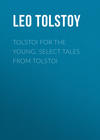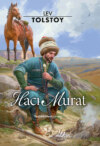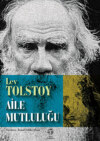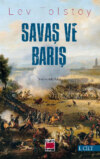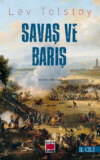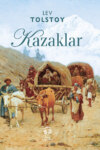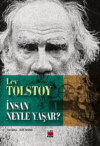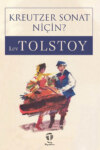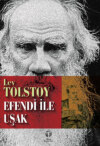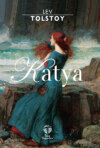Kitabı oku: «Tolstoi for the young. Select tales from Tolstoi», sayfa 4
The old woman had quite softened by now.
“Children will be children,” she said to Martin in reference to the boy. “The Lord bless them.”
She was about to raise her bag on to her shoulder when the boy rushed up and said, “Let me carry it, Granny; I’m going your way.”
The old woman shook her head and put the bag on the boy’s shoulder. And they walked down the street side by side. The old woman had forgotten to ask Martin to pay for the apple. Martin stood and watched them, listening to their voices as they talked together.
When they were out of sight he turned in, found his spectacles on the stairs quite whole, took up his awl and sat down to his work once more. After a while he could not see to pass the thread through the holes and he noticed the lamplighter lighting the street lamps. “I must light up,” he thought. And he trimmed the lamp, hung it up and went on with his work. He finished the boot he was doing and turned it over to examine it. He then put away his tools, cleared up the bits of leather and thread and awls, took down the lamp, put it on the table and took the Bible down from the shelf. He wanted to open it at the place he had marked with a piece of morocco, but it opened at another place. And as he opened the Gospels Martin recalled his dream of last night. And no sooner had he thought of it than he seemed to hear some one move behind him, as though some one were coming towards him. He turned, and it seemed to him that people were standing in the dark corner, but he could not make out who they were. And a voice whispered into his ear, “Martin, Martin, don’t you know me?”
“Who is it?” Martin asked.
“It is I,” the voice said.
And Stepan stepped out of the dark corner, smiling, and vanished like a cloud, and he was no more.
“It is I,” the voice said again, and from out the dark corner stepped the woman with the baby, and she smiled and the child smiled, and they too vanished.
“It is I,” said the voice once more, and out stepped the old woman and boy with an apple in his hand, and both smiled and also vanished.
And a feeling of gladness entered Martin’s soul. He crossed himself, put on his spectacles and began to read the Gospel just where it had opened. At the top of the page were the words, “For I was an hungered, and ye gave me meat; I was thirsty and ye gave me drink; I was a stranger and ye took me in…”
And at the bottom of the page he read, “Inasmuch as ye have done it unto one of the least of these brethren, ye have done it unto me.”
And Martin understood that his dream had come true and that his Saviour had really come to him that day, and that he had welcomed Him.
A PRISONER
An officer by the name of Jilin served in the army in the Caucasus.
One day he received a letter from home. It was from his mother, who wrote, “I am getting old now, and I want to see my beloved son before I die. Come and say good-bye to me, and when you have buried me, with God’s grace, you can return to the Army. I have found a nice girl for you to marry; she is clever and pretty, and has some property of her own. If you like her perhaps you will marry and settle down for good.”
Jilin pondered over the letter. It was true; his mother was really failing fast, and it might be his only chance of seeing her alive. He would go home, and if the girl was nice, he might even marry.
He went to his colonel and asked for leave, and bidding good-bye to his fellow-officers, gave his men four bucketfuls of vodka as a farewell treat, and got ready to go.
There was a war in the Caucasus at the time. The roads were not safe by day or by night. If a Russian ventured away from his fort, the Tartars either killed him or took him off to the hills. So it had been arranged that a body of soldiers should march from fortress to fortress to convoy any person who wanted to travel. The soldiers marched in front and behind; the travellers in between them.
It was summer. At daybreak the baggage-train was loaded behind the fort; the convoy came out and started along the road. Jilin was on horseback; his things were on a cart with the baggage-train.
They had about twenty miles to go. The baggage-train moved along slowly; now the soldiers would stop, now a wheel came off a cart, now a horse would refuse to go on, and then everybody had to wait.
It was already past noon and they had not covered half the distance. It was hot, dusty, the sun scorching and no shade at all – bare steppe, with not a tree or a bush the whole way.
Jilin rode on ahead and stopped to wait until the baggage-train should catch him up. He heard the signal-horn sounded; the company had stopped again. Jilin thought, “Why shouldn’t I go on alone without the soldiers? I have a good horse, and if I come across any Tartars I can easily gallop away. I wonder if it would be safe?”
As he stood there thinking it over, another officer, by the name of Kostilin, rode up with a rifle and said, “Let us go on alone, Jilin. I’m dreadfully hungry, and the heat’s unbearable. My shirt is wringing wet.”
Kostilin was a big man and stout; his face was burning red, and the perspiration poured from his brow.
Jilin deliberated for a moment and said, “Is your rifle loaded?”
“It is.”
“Very well; come along. Only the condition is to be that we don’t part.”
And they set off down the road alone. They were riding along the steppe talking together and keeping a sharp look-out from side to side. They could see a long way round them. When they left the steppe they came to a road running down a valley between two hills. And Jilin said, “Let’s go up on that hill and look about; some Tartars might easily spring out from the hills and we shouldn’t see them.”
“What’s the use?” Kostilin said. “We’d better go on.”
Jilin paid no heed to him.
“You wait down here,” he said, “and I’ll just go up and have a look.” And he turned his horse to the left up the hill. Jilin’s horse was a hunter and carried him up the hill as though it had wings. He had bought it for a hundred roubles as a colt, and broken it in himself. When he reached the top of the hill he saw some thirty Tartars a few paces ahead of him. He turned hastily, but the Tartars had seen him and gave chase down the hill, getting their rifles out as they went. Jilin bounded down as fast as the horse’s legs would carry him, crying out to Kostilin, “Get your rifle ready!” And in thought he said to his horse, “Get me out of this, my beauty; don’t stumble, or I’m lost. Once I reach the rifle, they shan’t take me alive!”
But Kostilin, instead of waiting when he saw the Tartars, set off full gallop in the direction of the fortress, lashing his horse now on one side, now on the other, and the horse’s switching tail was all that could be seen of him in the clouds of dust.
Jilin saw that it was all up with him. The rifle was gone; with a sword alone he could do nothing. He turned his horse in the direction of the convoy, hoping to escape, but six Tartars rushed ahead to cut him off. His horse was a good one, but theirs were better, and they were trying to cross his path. He wanted to turn in another direction, but his horse could not pull up and dashed on straight towards the Tartars. A red-bearded Tartar on a grey horse caught Jilin’s eyes. He was yelling and showing his teeth and pointing his rifle at him.
“I know what devils you are!” Jilin thought. “If you take me alive, you’ll put me in a pit and have me flogged. I’ll not be taken alive!”
Though Jilin was a little man, he was brave. He drew his sword and dashed at the red-bearded Tartar, thinking, “I’ll either ride him down or kill him with my sword.”
But he had no time to reach the Tartar; he was fired at from behind and his horse was hit. It fell to the ground full weight, pinning Jilin’s leg. He attempted to rise, but two evil-smelling Tartars were already sitting on him, twisting his arms behind him. He struggled, flung the Tartars off, but three others leapt from their horses and fell on him, beating him on the head with the butt ends of their rifles. A mist rose before his eyes and he staggered. The Tartars seized him, and taking spare girths from their saddles twisted his hands behind him and tied them with a Tartar knot and dragged him to the saddle. They knocked off his cap, pulled off his boots, searched him all over, took his money and watch and tore his clothes. Jilin looked round at his horse. The poor creature lay on its side just as it had fallen, struggling with its legs in the air and unable to get them to the ground. There was a hole in its head from which the dark blood was oozing, laying the dust for a yard around.
One of the Tartars approached it and took off the saddle. As it was still struggling, he drew a dagger and cut its windpipe. A whistling sound came from its throat; the horse gave a shudder and died.
The Tartars took off the saddle and strappings. The red-bearded Tartar mounted his horse, the others lifted Jilin into the saddle behind him, and, to prevent his falling off, they strapped him to the Tartar’s girdle, and took him off to the hills.
Jilin sat behind the Tartar, rocking from side to side, his face touching the evil-smelling Tartar’s back. All he could see was the man’s broad back and sinewy neck, the closely-shaven bluish nape peeping out from beneath his cap. Jilin had a wound in his head, from which the blood poured and congealed over his eyes, but he could not shift his position on the saddle, nor wipe off the blood. His arms were twisted so far behind his back that his collar-bones ached. They rode over the hills for some time, then they came to a river which they forded and got out on to a road running down a valley. Jilin wanted to see where they were going, but his eyes were matted with blood and he could not move.
It began to get dark; they forded another river and rode up a rocky hill; there was a smell of smoke and a barking of dogs. They had reached a Tartar village. The Tartars got off their horses; the Tartar children gathered round Jilin, yelling and throwing stones at him. A Tartar drove them away, took Jilin off the horse and called his servant. A man with high cheek-bones came up, clad in nothing but a shirt, and that so torn that his breast was bare. The Tartar gave him some order. The man brought some shackles, two blocks of oak with iron rings attached, and a clasp and lock was fixed to one of the rings.
They untied Jilin’s arms, put on the shackles, took him to a shed, pushed him in and locked the door. Jilin fell on to a dung heap. He groped about in the darkness to find a softer place and lay down.
II
Jilin did not sleep the whole of that night. The nights were short. Through a chink he saw that it was getting light. He got up, made the chink a little bigger and peeped out.
He saw a road at the foot of a hill, to the right of which was a Tartar hut with two trees near it. A black dog lay on the threshold and a goat and kids were moving about and swishing their tails. Then he saw a young Tartar woman coming from the direction of the hill. She wore a coloured blouse and trousers with a girdle round her waist, high boots on her feet and a kerchief on her head, on which she was carrying a tin pitcher of water. Her back moved gracefully as she walked; she was leading a closely-shaven Tartar boy, who wore nothing but a shirt. The Tartar woman went into the hut with the water; the red-bearded Tartar of yesterday came out in a silken tunic, a silver-hilted knife stuck in his girdle and slippers on bare feet. A high, black sheepskin cap was pushed far back on his head. He stretched himself as he came out and stroked his red beard. He gave some order to his servant and went away.
Then two boys rode past. They had been to water their horses and the horses’ noses were still wet. Some more closely-shaven boys came out, dressed only in shirts with no trousers. A whole group of them came up to the shed, and taking up a piece of stick, they thrust it through the chink. Jilin grunted at them and the boys ran off, yelling, their little white knees gleaming as they went.
Jilin was thirsty; his throat was parched. “If only some one would come,” he thought. Soon the door of the shed opened and the red-bearded Tartar entered with another, shorter than he, and dark. He had bright black eyes, a ruddy complexion and a short beard. He had a jolly face, and was always laughing. This man was dressed better than the first, in a blue silken tunic, trimmed with braid. The knife in his broad girdle was of silver, the shoes on his feet were of red morocco, embroidered in silver thread, and over these he wore a thicker pair of shoes. His cap was high and of white sheepskin.
The red-bearded Tartar entered, muttering some angry words. He leant against the doorpost, playing with his dagger and looking askance at Jilin, like a wolf. The dark man, quick and lively and moving as if on springs, came up to Jilin and squatted down in front of him, showing his teeth. He clapped Jilin on the shoulder and began to jabber something in his own language, blinking his eyes and clacking his tongue. “Good Russ! Good Russ!” he said.
Jilin understood nothing. “I am thirsty; give me some water,” he said.
The dark man laughed. “Good Russ!” he kept on saying.
Jilin made signs with his lips and hands that he wanted some water. The dark man laughed, and putting his head out at the door, he called to some one “Dina!”
A little girl came up. She was about thirteen, slight and thin, her face resembling the dark man’s. She was obviously his daughter. She, too, had bright, black eyes and a rosy complexion. She was clad in a long blue blouse with broad sleeves, and loose at the waist – the hem and front and sleeves were embroidered in red. She wore trousers and slippers and shoes with high heels over them; she had a necklace round her throat made out of Russian coins. Her head was bare. Her black plait was tied with a ribbon, the ends of which were trimmed with silver roubles.
Her father said something to her. She ran away and came back again with a tin jug of water. She gave it to Jilin and also squatted down in front of him, huddled up, so that her shoulders came lower than her knees. She sat staring at Jilin as he drank, as at some strange animal.
Jilin handed her back the jug. She took it and bounded out like a wild goat. Even her father could not help laughing. He sent her off somewhere else. She ran away with the jug and brought back some unleavened bread on a round wooden platter, and huddling down in front of him once more, she again stared at him open-eyed.
The Tartars went out and locked the door.
After a while the red-bearded man’s servant came up and called to Jilin. He too, did not know Russian, only Jilin understood that he wanted him to go somewhere.
Jilin followed him limping, for the shackles impeded his walking. He followed the servant. They came to a Tartar village, consisting of about ten houses, a Tartar church with a dome on top in the midst of them. In front of one house stood three saddled horses; some boys were holding them by their bridles. The dark little Tartar rushed out of this house and beckoned to Jilin to come to him. He laughed, jabbered something in his own tongue and went in again. Jilin came to the house. The room was large, the mud walls smoothly plastered. Near the front wall lay a pile of brightly coloured feather beds, on the side walls hung rich rugs with rifles and pistols and swords fastened to them, all inlaid in silver. At one wall was a small stove on a level with the earthen floor, which was beautifully clean. In the near corner a felt carpet was spread on which were rich rugs and down cushions. On these rugs, in slippers only, sat some Tartars – the dark one, the red-bearded one and three guests. All had down cushions at their backs. In front of them, on a wooden platter, were some millet pancakes, some melted butter in a cup and a jug of Tartar beer. They took the pancakes up with their fingers, and their hands were all greasy with the butter.
The dark Tartar jumped up and bade Jilin sit down, not on the rugs, but on the bare floor. Then he sat down on his rug again, and treated his guests to more pancakes and beer. The servant made Jilin sit down in the place assigned to him, took off his overshoes, which he placed by the door where the other shoes were standing, and sat down on the felt carpet, nearer to his master. He watched the others eating, his mouth watering. When the Tartars had finished, a woman came in dressed like the girl in trousers and a kerchief on her head. She cleared away the remains, and brought a basin and a narrow-necked jug of water. The Tartars washed their hands, laid them together, fell on their knees and said their prayers in their own tongue. When they had finished one of the guests turned to Jilin and addressed him in Russian.
“You were captured by Kasi-Mohammed,” he said, indicating the red-bearded Tartar, “but he has given you to Abdul-Murat.” And he indicated the dark Tartar. “Abdul-Murat is now your master.”
Jilin was silent.
Abdul-Murat now began to speak, pointing at Jilin and laughing. “A soldier Russ, a good Russ,” he said.
And the interpreter said, “He wants you to write home asking your people to send a ransom for you. When the money comes, he will let you go.”
Jilin reflected and said, “How much does he want?”
The Tartars deliberated among themselves; the interpreter said, “Three thousand roubles.”
“I can’t pay as much as that,” Jilin said.
Abdul leapt up and began to gesticulate violently. He was saying something to Jilin, thinking that he would understand.
“How much will you give?” the interpreter asked.
After reflection Jilin said, “Five hundred roubles.”
At this the Tartars all began talking together. Abdul shouted at the red-bearded Tartar, jabbering away till he foamed at the mouth. The red-bearded Tartar merely frowned and clacked his tongue.
They grew silent and the interpreter said, “The master thinks a ransom of five hundred roubles is not enough. He himself paid two hundred roubles for you. Kasi-Mohammed was in his debt, and he took you in payment. He wants three thousand roubles and refuses to let you go for less. If you won’t pay the money you’ll be flung into a pit and flogged.”
“The more you show you’re afraid of them, the worse it is,” Jilin thought. He leapt to his feet and said, “Tell the dog that if he begins to threaten me, he shan’t have a farthing! I won’t write home at all! I was never afraid of you, and I’m not going to be now, you dogs!”
The interpreter conveyed his words, and again the Tartars began to speak all at once.
They jabbered for a long time, then the dark one sprang up and came to Jilin.
“Russ,” he said, “djigit, djigit Russ!” (Djigit in their tongue means brave.) He laughed and said a few words to the interpreter, who turned to Jilin.
“Will you give a thousand roubles?”
Jilin stuck to his own.
“I won’t give more than five hundred, not if you kill me.”
The Tartars conferred together, and sent the servant off somewhere, and when he was gone they stared now at Jilin, now at the door.
The servant returned, followed by a stout, bare-footed man, in torn clothes. On his feet were also shackles. Jilin gave an exclamation of surprise. It was Kostilin. He, too, had been captured then. The Tartars sat them down side by side, and they began to tell each other of their experiences, the Tartars looking on in silence. Jilin told Kostilin what had happened to him, and Kostilin told Jilin that his horse had got tired, his rifle missed fire, and that this same Abdul had caught him up and captured him.
Abdul jumped up and began to speak, pointing at Kostilin. The interpreter explained that they both belonged to the same master, and that the one who would produce the money first would be the first to be set free.
“See how quiet your comrade is,” he said to Jilin. “You get angry and he has written home asking to have five thousand roubles sent him. He will be well fed, and no one will do him any harm.”
And Jilin said, “My comrade can do what he likes. He may be rich, and I am not. I won’t go back on my word. You can kill me if you like, but you get no advantage by that; I won’t write for more than five hundred roubles.”
The Tartars were silent. Suddenly Abdul sprang up, took out a pen, ink and a scrap of paper from a little box, put them in Jilin’s hands and slapping him on the shoulder, said, “Write.” He had agreed to the five hundred roubles.
“One moment,” Jilin said to the interpreter; “tell him that he must feed and clothe us well, and that he must put us together so that we don’t feel so lonely, and he must remove our shackles.”
He looked at Abdul as he spoke and smiled. Abdul too smiled and said, “You shall have the best of clothes – coats and boots fit to be married in, and you shall be fed like princes, and you can be together in the shed if you like, but I can’t take off the shackles because you might escape. You shall have them removed at night.” He rushed up to Jilin and slapped him on the shoulder. “Fine fellow! fine fellow!” he said.
Jilin wrote the letter, but did not address it correctly, so that it should not reach home. “I will escape, somehow,” he thought.
Jilin and Kostilin were taken back to the shed. They were given some straw, a jug of water and bread, two old coats and some worn boots, evidently taken from the bodies of dead soldiers. At night their shackles were removed and they were locked in the shed.
